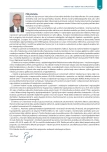-
Medical journals
- Career
Dyslipoproteinemias in endocrinopathies
Authors: Zbynek Schroner
Authors‘ workplace: SchronerMED, s. r. o., interná a diabetologická ambulancia, Košice
Published in: AtheroRev 2016; 1(2): 85-87
Category: Reviews
Overview
Except for primary (genetic caused) dyslipoproteinemias, in clinical practice frequent are also secondary dyslipoproteinemias, which are consequence of other basic disorder that alters metabolism of lipids and lipoproteins. Some endocrinopathies lead to quantitative and qualitative changes of lipid composition. Type 1 and also type 2 diabetes mellitus cause alterations of metabolism of lipids and lipoproteins. Hypothyroidism is typical representative of secondary dyslipoproteinemias. As a consequence of decreased effect of thyroidal hormones, hypothyroidism is characterized of elevated levels of total and LDL cholesterol in plasm. Dyslipoproteinemias also occur in some other endocrinopathies.
Key words:
dyslipoproteinemias – endocrinopathies – hypothyroidism
Sources
1. Schroner Z, Lazúrová I. Postihnutie kardiovaskulárneho systému u diabetikov so súčasne prítomnou poruchou funkcie štítnej žľazy. Vnitř Lék 2006; 52(11): 1069 - 1076.
2. Fábryová Ľ. Dyslipoproteinémie. In: Kreze A, Langer P, Klimeš I et al. Všeobecná a klinická endokrinológia. AEP: Bratislava 2004 : 529–551. ISBN ISBN 80–88880–58–0.
3. Schroner Z, Lazúrová I. Diabetes mellitus a subklinické poruchy funkcie štítnej žľazy. DMEV 2006; 9(1): 7–12.
4. Zamrazil V, Váňa S, Němec J. Štítná žláza a kardiovaskulárny systém. In: Stárka. L. Aktuální endokrinologie: vybrané kapitoly ze současné aktuální problematiky endokrinologie. Maxdorf: Praha 1999 : 468–477. ISBN 80–85912–10–4.
5. Hak AE, Pols HA, Visser TJ et al. Subclinical hypothyroidism is an independent risk factor for atherosclerosis and myocardial infarction in elderly women: Ann Int Med 2000; 132(4): 270 - 278.
6. Bakker SJ, Maaten JC, Popp-Snijders C et al. The relationship between thyrotropin and low density lipoprotein cholesterol is modified by insulin sensitivity in healthy euthyroid subjects .J Clin Endocrinol Metab 2001; 86(3): 1206–1211.
7. Vrablík M, Češka R. Sekundární dyslipoproteinémie. Via Pract 2004; 1(1): 14–17.
8. Rizos CV, Elisaf MS, Liberopoulos EN. Effects of thyroid dysfunction on lipid profile. Open Cardiovasc Med J 2011; 5 : 76–84.Dostupné z DOI: <http://dx.doi.org/10.2174/1874192401105010076>.
9. Duntas LH, Brenta G. The effect of thyroid disorders on lipid levels and metabolism. Med Clin N Am 2012; 96(2): 269–281.
10. Van Tienhoven-Wind LJ, Dullaart RP. Low-normal thyroid function and the pathogenesis of common cardio-metabolic disorders. Eur J Clin Invest 2015; 45(5): 494–503.
11. Peppa M, Betsi G, Dimitriadis G. Lipid abnormalities and cardiometabolic risk in patients with overt and subclinical thyroid dissease. J Lipids 2011; 2011 : 575840. Dostupné z DOI: <http://dx.doi.org/10.1155/2011/575840>.
12. Arnaldi G, Scandali VM, Trementino L et al. Pathophysiology of dyslipidemia in Cushing´s syndrome. Neuroendocrinology 2010; 92(Suppl1): 86–90.
Labels
Angiology Diabetology Internal medicine Cardiology General practitioner for adults
Article was published inAthero Review

2016 Issue 2-
All articles in this issue
- Editorial board
- Monoclonal antibodies in the internal medicine
- Diabetes mellitus and lipid metabolism
- Adverse metabolic effects of antihypertensive drugs. Is it clinically relevant at all?
- Secondary dislipidemia in renal disease
- Dyslipoproteinemias in endocrinopathies
- LDL-cholesterol – the main risk factor for atherosclerosis
- Alirocumab, Praluent® in the light of studies
- Athero Review
- Journal archive
- Current issue
- Online only
- About the journal
Most read in this issue- Monoclonal antibodies in the internal medicine
- Diabetes mellitus and lipid metabolism
- Alirocumab, Praluent® in the light of studies
- LDL-cholesterol – the main risk factor for atherosclerosis
Login#ADS_BOTTOM_SCRIPTS#Forgotten passwordEnter the email address that you registered with. We will send you instructions on how to set a new password.
- Career

